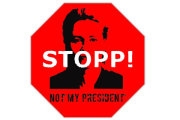|
|
Germany: The resigned President and the power of social media7. June 2010 – 18:23 by Rolf Luehrs |
Last weeks resignation of Horst Köhler as Federal President is a unique incident in Germany’s history and demonstrates that social media have become a political force that can not be neglected anymore.
Horst Köhler resigned as Federal President because of public criticism of his comments about Germany’s mission in Afghanistan. Interestingly the radio interview in which he elaborated on the reasons for Germany’s international military engagement was broadcast by May 22nd already and did not lead to noteworthy coverage in the mainstream media.
The first to pick up Köhler’s controversial remarks about the relations of Germany’s economic interests and the Afghanistan mission was the fairly unknown blog unpolitik.de, followed by five others with a rather limited reach. In parallel also better known bloggers covered the story – but still none of the mainstream media (see carta.info for a detailed report).
One of the bloggers ( ) who felt especially disgusted about the media’s ignorance directly approached several big newspapers and magazines via twitter, asking for some reaction.

After “Deutschlandradio” broadcasted an interview with the Christian Democrat Ruprecht Polenz on May 27th, who said that Köhler expressed himself imprecisely, the media storm slowly gained momentum. A very critical report that appeared in Germany’s biggest news magazine “Der Spiegel” might finally have pushed Köhler over the edge.
But influence of social media did not end here. Pretty soon after the political class had overcome the state of shock, Chancellor Angela Merkel was said to have already a favourite for the vacant position: the quite well reputed Minister for Family Affairs, Ursula von der Leyen. Unfortunately von der Leyen became a hate figure among netizens in 2009 due to her ambitions to block Internet sites in order to fight child pornography. The respective policy was perceived by the net community as attempt to set up a censorship infrastructure generally enabling the government to block particular websites.
A strong and still growing network opposing these ideas quickly formed within the German internet community. (…) The HashTag used by the protesters is #zensursula – a German mash up of the Minister’s name and the word censorship equivalent to #censursula. As part of the public’s protest an official e-Petition directed at the German parliament was launched. Within three days 50,000 persons signed the petition – – the number required for the petition titled „No indexing and blocking of Internet sites“ to be heard by the parliament. The running time of an e-Petition in Germany is 6 weeks – within this time over 130,000 people signed making this e-Petition the most signed and most successful ever. (link)
Quite understan dably this movement against net censorship was not delighted by the prospect of von der Leyen becoming Germany’s next President – and immediately revived the campaign. For the same reason but even more important the Liberal Democrats – part of the currently governing coalition – rejected the proposal as well.
dably this movement against net censorship was not delighted by the prospect of von der Leyen becoming Germany’s next President – and immediately revived the campaign. For the same reason but even more important the Liberal Democrats – part of the currently governing coalition – rejected the proposal as well.
The German chancellor adapted to the situation immediately and presented the state premier of Lower Saxony, Christian Wulff, as official candidate instead.
But the story still continues: In a very smart move, the opposition of social democrats and greens complained about the selection procedure and the party-political bias and presented Joachim Gauck as candidate. “Joachim Gauck, 70, a Protestant pastor from eastern Germany who opposed the communist regime, someone whom Merkel herself has showered with praise in the past. After unification, Gauck spent 10 years heading the authority that manages the archives of East Germany’s secret police, the Stasi, thereby making a major contribution to shedding light on the crimes of East Germany” (link).
This time it looks that mainstream and social media join forces to push Gauck’s candidature. While “Der Spiegel” led with “Gauck – the better President”, folks started different kinds of social media campaigns. Examples are a website showing a picture made of avatars of twitter users who tweeted the hashtag #mygauck and different types of online petitions (1,2). Meanwhile the hashtag #mygauck already made it to the top of the most used German twitter tags today. It remains an open question whether all this will have any influence on the election results, but it clearly shows that social media have become politically relevant in Germany.
UPDATE (10.6.2010):
The campaign develops:
Facebook Group: 24622 Member
Online-Petition 1: 7121 Total Signatures
Online Petition 2: 5827 Total Signatures
Gauck addresses supporters via youtube:
Tags: Host Köhler, inenglish, Joachim Gauck









One Response to “Germany: The resigned President and the power of social media”
By Rolf Luehrs on Jun 10, 2010
Update (Resigned President)10.6.2010